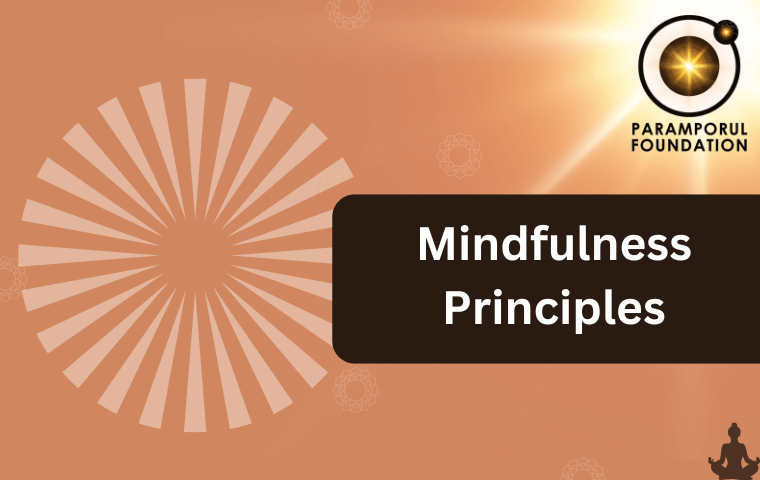Mindfulness is about fully engaging with the present moment in a non-judgmental way. It’s a powerful practice that fosters inner peace, clarity, and balance. Whether you’re just starting or refining your mindfulness journey, the Mindfulness Principles developed by Jon Kabat-Zinn serve as a foundation to cultivate awareness and compassion in everyday life.
Let’s explore these principles in depth, along with simple ways to practice them.
1. Non-Judging

We are often quick to judge ourselves, others, and situations. These judgments may arise automatically, shaping our perceptions and influencing decisions without us even realizing it. The principle of non-judging invites us to observe our thoughts, emotions, and experiences without labeling them as “good” or “bad.”
How to practice it:
- When you notice yourself being critical, pause and acknowledge the judgment without acting on it.
- For example, if you think, “I’m not good at this,” recognize it as just a thought, not a fact.
- By observing without judgment, you create space to respond thoughtfully rather than react impulsively.
2. Patience

Patience is a virtue, but in today’s fast-paced world, it’s often overlooked. Life’s natural processes take time, and rushing through them can lead to frustration and stress. Patience encourages us to embrace each moment, trusting that things will unfold in their own time.
How to practice it:
- Notice moments when you feel impatient, like waiting in line or learning a new skill. Instead of getting frustrated, remind yourself that these experiences are part of life’s rhythm.
- Practice mindfulness meditation by gently concentrating on your breath and allowing your mind to relax effortlessly.
- Patience encourages us to slow down and embrace the journey rather than becoming preoccupied with the destination.
3. Beginner’s Mind

Approaching life with a beginner’s mind means seeing things as if for the first time, with curiosity and openness. This principle helps us break free from assumptions and routine thinking, allowing us to fully appreciate the richness of each moment.
How to practice it:
- Pay attention to familiar experiences as if they were brand new. For example, notice the details of your morning coffee, such as the aroma, taste, and warmth.
- Let go of preconceived notions and be open to discovering something new, even in routine tasks.
- When you embrace a beginner’s mind, you open yourself to endless possibilities and insights.
4. Trust

Trusting yourself and your instincts is vital for cultivating mindfulness. While external guidance can be helpful, your inner wisdom often holds the key to what’s best for you. Trust also involves having faith in the process of mindfulness itself, even when results aren’t immediately apparent.
How to practice it:
- Take time to listen to your inner voice, especially when faced with decisions.
- Trust that you are capable of navigating challenges and growing through them.
- Building trust in yourself fosters confidence and resilience.
5. Non-Striving

In a goal-oriented world, the principle of non-striving feels revolutionary. Mindfulness is not about achieving or fixing anything; it’s about being present with what is. This principle encourages acceptance of yourself as you are right now.
How to practice it:
- During meditation, focus on simply being without trying to reach a specific state.
- Let go of the need to accomplish or perfect things. Instead, savor the process.
- Non-striving helps you break free from the cycle of constant doing and discover the joy of being.
6. Acceptance

Acceptance involves seeing things as they truly are without resistance or denial. This doesn’t mean resignation or giving up; instead, it’s about acknowledging reality so you can respond to it thoughtfully.
How to practice it:
- When faced with a challenge, take a moment to name your feelings. For instance, say, I feel disappointed, or I’m anxious.
- Focus on observing your emotions without pushing them away or trying to change them immediately.
- Through acceptance, you empower yourself to act from a place of clarity and peace.
7. Letting Go

We often hold onto regrets about the past or worries about the future, which can weigh heavily on our minds. Letting go involves freeing yourself from attachments to thoughts, emotions, and outcomes that no longer benefit you.
How to practice it:
- Notice recurring thoughts or feelings that cause distress. Imagine releasing them like leaves floating down a stream.
- Remind yourself that holding on tightly doesn’t change the past or control the future.
- Letting go creates space for new possibilities and frees your mind to focus on the present.
Bringing the Mindfulness Principles into Everyday Life
Mindfulness doesn’t require hours of effort. By integrating small practices into your daily routine, you can live more mindfully:
- Conscious Breathing: Set aside a few moments daily to concentrate on your breath. Feel the air as it moves in and out of your body.
- Mindful Eating: Slow down during meals. Without distractions, focus on the taste, texture, and aroma of your food.
- Gratitude Practice: Reflect on one or two things you’re grateful for each evening.
The journey of mindfulness is personal and ever-evolving. Start with one principle that resonates with you and gradually incorporate others. With consistent practice, these Mindfulness Principles can transform how you experience the world, bringing greater peace, joy, and balance to your life.

